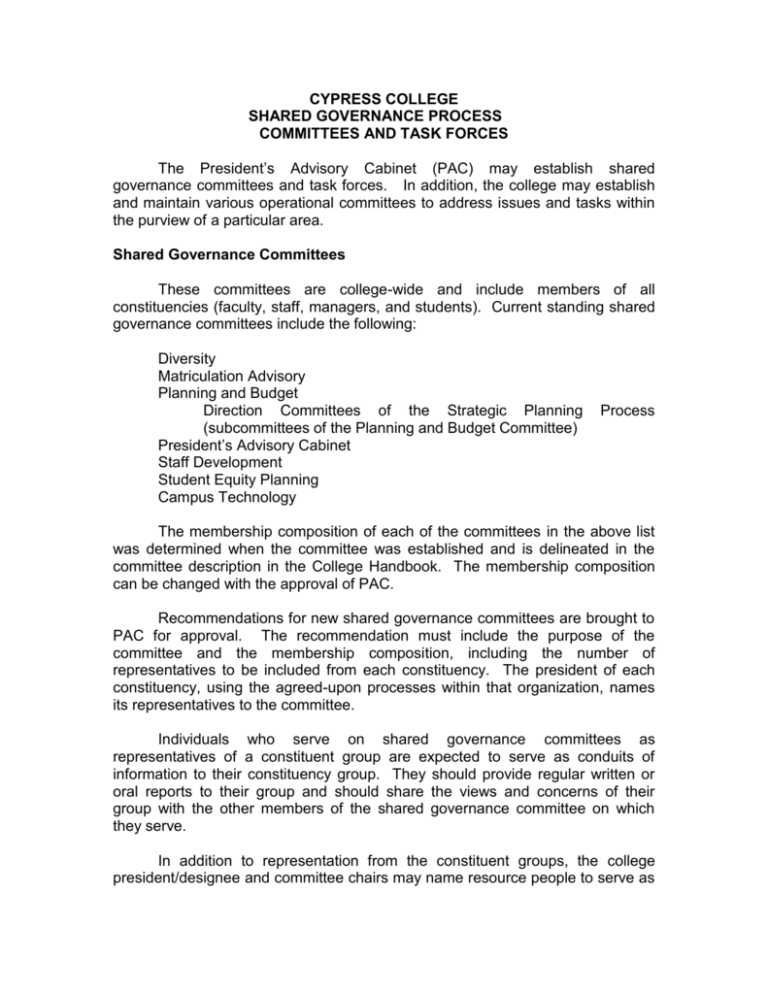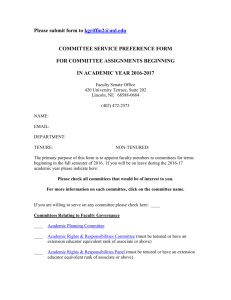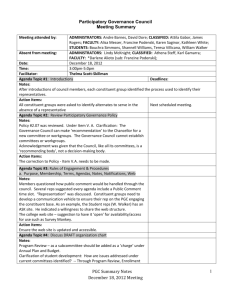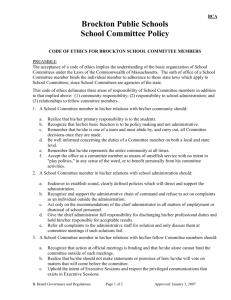Shared Governance Process
advertisement

CYPRESS COLLEGE SHARED GOVERNANCE PROCESS COMMITTEES AND TASK FORCES The President’s Advisory Cabinet (PAC) may establish shared governance committees and task forces. In addition, the college may establish and maintain various operational committees to address issues and tasks within the purview of a particular area. Shared Governance Committees These committees are college-wide and include members of all constituencies (faculty, staff, managers, and students). Current standing shared governance committees include the following: Diversity Matriculation Advisory Planning and Budget Direction Committees of the Strategic Planning (subcommittees of the Planning and Budget Committee) President’s Advisory Cabinet Staff Development Student Equity Planning Campus Technology Process The membership composition of each of the committees in the above list was determined when the committee was established and is delineated in the committee description in the College Handbook. The membership composition can be changed with the approval of PAC. Recommendations for new shared governance committees are brought to PAC for approval. The recommendation must include the purpose of the committee and the membership composition, including the number of representatives to be included from each constituency. The president of each constituency, using the agreed-upon processes within that organization, names its representatives to the committee. Individuals who serve on shared governance committees as representatives of a constituent group are expected to serve as conduits of information to their constituency group. They should provide regular written or oral reports to their group and should share the views and concerns of their group with the other members of the shared governance committee on which they serve. In addition to representation from the constituent groups, the college president/designee and committee chairs may name resource people to serve as non-voting members of shared governance committees. If these non-voting members are to be permanent positions on the committee, then their positions (titles, e.g., Dean of Counseling) should be delineated on the official membership composition list for the committee and should be approved by PAC. “Temporary” (determined on a semester-by-semester basis) non-voting members do not need to be added to the official membership composition list. All shared governance committee meetings are open to visitors. Individual committees may determine the processes to be used to allow these visitors to interact with the committee during committee meetings. The Staff Development Office maintains a list of members for each committee and notifies the president of the appropriate constituent group when the term of office of that group’s appointees on a particular committee is set to expire. This notification will occur early in the spring semester so that new members can be named by the end of the spring semester and join the committee at the beginning of the fall semester. Shared governance committees present recommendations to PAC for approval before they are implemented. Minutes of shared governance committees are posted on the campus server. Academic Senate and Academic Committees The Academic Senate, the Curriculum Committee, and the Instructional Quality Assessment Committee are all part of the shared governance process but are not shared governance committees in that they are not established by PAC and do not necessarily have membership from all constituencies. The Curriculum Committee and IQA Committee are standing committees of the Academic Senate. The Petitions Committee is an academic committee with the following membership composition: Instructional Dean, Chair Dean, Admissions and Records Five faculty appointed by the Academic Senate One counselor appointed by the Academic Senate Student Advocate appointed by Associated Students Task Forces A task force may be created as needed to deal with specific (single item) issues relevant to the campus or district. The purpose of the task force and its membership composition are determined when PAC approves the task force. Depending on the purpose of the task force, it is possible that not all constituencies will be represented. Typically a task force functions for a limited period of time, perhaps for a year or two. The college president/designee and committee chairs may name resource people to serve as non-voting members of task forces. If non-voting members are added to a task force, the revised committee membership composition will be presented to PAC for information. Current (2006-07) task forces include the following: Children on Campus Reassigned Time Site and Facilities Student Services Master Plan Operational Committees Managers, individual departments, programs, and other units of the college may establish operational committees to address issues and tasks within the purview of that area. These committees are not shared governance committees and do not require constituency representation or appointments. The people who serve on these committees are selected because of the nature of their responsibilities at the college. Current (2006-07) college-wide operational committees include the following; 5% MORE (Marketing, Outreach, Retention, and Enrollment) Catalog, Registration, and Class Schedule Safety (This committee will always include at least one faculty member with expertise in health and safety.) Hiring Committees The composition of hiring committees and the procedures they follow are delineated in Board policies and procedures. Approved by President's Advisory Cabinet 02/01/07







